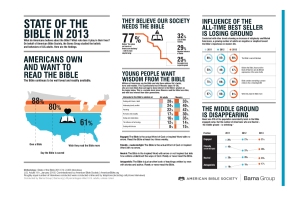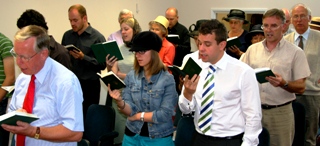It is perhaps one of the greatest paradoxes of the modern world that, in spite of its high-volume sales, the Bible is generally so little read. As Sir Frederic Kenyon once remarked: “Bible reading has been a notable characteristic of the English-speaking peoples from the Reformation to the end of the Victorian Age”, and the decline in
Bible reading has undoubtedly been “a serious loss to the moral and cultural equipment of the nation today”.
But why have people continued to buy the Bible while no longer reading it? How can we explain the paradox?
There are many reasons for this general decline in the reading of the Bible; but three principal causes may be identified for consideration here: the growth of certain popular misconceptions, the advent of scientific materialism, and the desire to exclude the miraculous element from religion. Rationalistic criticism of the Bible has succeeded over the last hundred years or so in persuading popular opinion that the Bible has been largely discredited.
It is commonly thought that the Bible contains many errors and internal contradictions which stamp it as the work of fallible men. This view is now the ‘received wisdom’ and, sad to say, very few of each rising generation even bother to check it out for themselves, for surely the experts and majority opinion cannot both be wrong?
– From: The Miracle of the Bible

Open Arabic Quran
Like many Muslims have not read the Quran or Koran many Christians haven’t really read the Bible. In several religions we can find people who have at most only read certain passages of their so called Holy Scriptures in their places of worship, be it a temple, church or mosque. Some may find this is understandable, as the Bible is hard to read according to them. Many people do find it is written in an archaic language and has obscure references. Also many priests and preachers don’t like to read certain passages in the Bible because they could be in contradiction with the teachings of that church or could make people to think about the Trinity.
Today’s English-reading believers are the most privileged Christians of all time. Available to us are more vernacular versions of Holy Scripture than any generation before us had, and all the mainline ones are good, in different ways, according to how each seeks to impact its targeted readership.
The Big Bible Project: Connecting Bible Conversations created a survey earlier this year to try to find out, and 250 people replied. Today we can find millions of people around the world who use mobile apps and websites to help them to read and understand the Bible. We can not ignore the handiness of e-readers, smartphones, i-pads, whihc do not present such a weight to carry and do not take up so much space as a real bounded book. For the survey 40% said they used a digital Bible every day, and another 45% used one every week. More than 200 of these readers included a written answer to the following question: “In what ways (if any) have digital media changed your relationship with the Bible?”
Very few of the respondents to the mentioned survey had anything to say about the design. Reading the Bible on a screen is found just easier, particularly for people who already love reading the Bible every day and the Bible is right there not making your bag heavy.
Many Evangelicals use the Bible as a source book for doctrine and right moral teaching, but more Christians depend on what their pastor is bringing from the pulpit and just accept his words. The Catholic church always tried to have her members not to read the Bible at home but just to accept the Scriptures quotes brought in the liturgy of Mass. For a Catholic, Scripture is not so much a book to be studied as a book to worship with. (Psalm 119.7) For Catholics the Bible is almost always used in the context of worship and they often do not see the need to take it up at home to read it and even less to study it. When Catholics go to mass they hear a reading from the Old Testament, they say or sing one of the Psalms, then they listen to a reading from the epistles, then a gospel reading. The whole structure fits together so the communion service if focused on Christ in the gospels. Catholics follow a three year cycle of Scripture reading so a Catholic who goes to church faithfully will–over the three years–hear almost all main parts of the Bible read. Furthermore, the responses, and the words of the communion service are almost all from Scripture. So a church-going Catholic does know and use Scripture–its just that he uses it primarily for meditation and worship (Psalm 119.48)–not for personal information and instruction.
Lots of believers do not see the necessity for reading or studying the Bible in private. they consider it quit enough to listen to the Bible quotes in church. they do not find any need to understand the Scriptures better to see how their faith or the faith of other denominations is rooted and grounded or not, in the Bible.
Opposite to Europe, on the American soil, the Bible may be firmly rooted with many Christians having a Bible and 80 percent think the Bible is sacred, 61 percent wish they read the Bible more, and the average household has 4.4 Bibles. (State of the Bible, 2013, The Barna Group study for American Bible Society, using 1,005 telephone interviews and 1,078 online surveys with a margin of error for the combined data of plus or minus 2 percentage points.)
The research uncovered a significant disconnect in belief versus behaviour. While 66% of those surveyed agreed that the Bible contains everything a person needs to know to live a meaningful life, 58% say they don’t personally want wisdom and advice from the Bible and about the same amount (57%) read it fewer than five times per year. Only 1 in 6 people reported buying a copy of the Bible in the last year, though Americans have plenty of copies at their fingertips—with an average of 4.4 Bibles per household. In Europe the families with more than one bible in the house are an exception.
In the United States according to the survey, more than half (57%) of those ages 18-28 report reading the Bible less than three times a year or never.
Doug Birdsall, president of American Bible Society, said he sees a reason for why the Bible isn’t connecting with people.
“I see the problem as analogous to obesity in America. We have an awful lot of people who realize they’re overweight, but they don’t follow a diet,” Birdsall said. “People realize the Bible has values that would help us in our spiritual health, but they just don’t read it.”
If they do read it, the majority (57 percent) only read their Bibles four times a year or less. Only 26 percent of Americans said they read their Bible on a regular basis (four or more times a week).
The Rev. James Martin, a Jesuit priest and author of “The Jesuit Guide to (Almost) Everything,” said the Bible can come across as intimidating to the uninitiated. “There’s a tendency to think that if you read the Bible, you have to read it from start to finish. But when people do read the Bible, they don’t know where to begin,” Martin said.
What we consider strange is that many Christians do prefer to read books about Christianity or certain subjects from a Christian point of view instead of taking the basic instruction book. People do prefer to read Christian books that promise biblical solutions for success in finances, relationships, and family. These books can help Christians see implications of their faith for various aspects of life, but they often communicate that the Bible is the authoritative answer book to felt needs and problems. This message centres on the individual and his or her preferences, and does not interpret the Bible in a way that calls felt needs into question or looks beyond them.
It’s not just well-meaning writers but also many biblical scholars who fail to approach the Bible as Christian Scripture. Some approach it only as ancient history, using it as a piece of evidence in answering archaeological or sociological questions about the ancient world. Other scholars try to reconstruct the thought of a book or author. A scholar can write an in-depth essay about Paul’s theology without ever considering that God could be addressing the scholar’s own time through Paul’s ancient texts.
Even those who try to connect the historical-critical context of a passage to today’s world can inadvertently suggest that most of the world’s Christians cannot truly understand God’s Word because they are not scholars.
Hearing so many times that ordinary people can not understand the Bible, it is no wonder that many do believe it is a book to difficult to tackle. they get the impression when the would read it they still would not be any wiser than before. Because they are afraid they would not become wiser or would even become more confused they leave it to others to read and to interpret it.

English: Old Testament – Douay Bible – 1609 – English College, University of Douai Français : Bible de Douai – 1609, Collège des Anglais, Université de Douai (Photo credit: Wikipedia)
J. Todd Billings continues:
Partly due to the inadequacies of popular and scholarly readings of the Bible, an increasing number of scholars have been advocating a “theological interpretation of Scripture.” They encourage us to read the Bible as God’s instrument of self-revelation and saving fellowship. This school of interpretation includes a wide range of practices, but all of them move us toward knowing the triune God and being formed as Christ’s disciples through Scripture.
Reading Scripture is not about solving puzzles but discovering what the Creator God wants from His creation and how He has provided many good things for us. In the early centuries of Christianity, the rule of faith helped make sure that Christians held together the Old Testament with the New Testament. Instead of leaving the Best-seller and Book of Books to stand in the cupboard or to leave it on the bookshelf in the library or bookshop, those interested in Christianity would be better to buy and to read the Bible in their own language. Only by reading the Bible yourself you shall be able to find out what is really written in it.
Those who claim to be Christian should be the first to go back to the book of the beginning of their church. The Bible is the Book full of answers, bringing the history of church, showing how people reacted on the teachings of their masters, who themselves followed the instructions of the Master teacher and Greatest Instructor God. Many Christians assume that they could glean a deeper and more profound meaning from Scripture if only they knew the original Greek, Hebrew, and Aramaic. they forget that God is a loving God who would like that all people all over the world would get to know Him. Therefore He has taken care that His Word can come to as many as possible, also in a language they would be able to understand. We agree that knowing the original languages is a surplus and is a major key. But there have been provided enough Bible translations to offer valuable textbooks to learn from. We may accept that those bible translations which could face the time would be translations which God agrees with and would not be secondary fill-ins. Rather, they are integral to the ongoing and primary expression of God’s message to us.
God has given the world His Word by the prophets and Biblical writers. god used a long historical narrative full of poetry, instruction, and visions in order to communicate who He is in relation to us. By studying this comprehensive work, the Bible, we find out about — indeed, find — God.
If you are not looking for God, it may be interesting to wonder how it came that the Bible could become such a best-seller and why it is such an interesting book to read. It has more to offer than you would think.
The Bible has not become the number one selling book in the world for nothing.
So please do find a Bible and start reading it and find out how it also can inspire you.
+
Preceding articles:
Book of books and great masterpiece
Dutch version / Nederlandse versie: Ongelezen Bestseller
++
Additional readings:
- Bible Word of God, inspired and infallible
- Who Wrote the Bible?
- Why believing the Bible
- No prophecy of the scripture is of any private interpretation
- The Bible: God’s Word or pious myth?
- Why believing the Bible
- Unsure about relevance Bible
- The importance of Reading the Scriptures
- Plain necessary food of the Gospel
- Bible power to change
- Bible a guide – Bijbel als gids
- Bible Basics
- Bible for you and for life
- The Bible is a today book
++
- The Bible Really Is God’s Inspired Word
- Understanding the Bible—What Are the Keys?
- Is the Bible a White Man’s Book?
- State of the Bible in 2013
- Why Don’t Catholics Read the Bible?
- J. Todd Billings: How to Read the Bible
- Why Don’t People Read the Bible?
Some people don’t read the Bible because Bible reading is deemed to be an outdated practice of the past, perhaps associated with strict or fundamentalist religion.
+
Others may not read the Bible because they can’t understand the language it is written in; or at least the particular translation they are trying to read.
+
Some may not read the Bible because they don’t’ understand it, theologically speaking.
+
Others don’t read the Bible because they find it to be boring.
+
Some don’t read the Bible because some things in the Bible can’t be taken literally, so if all of it can’t be taken literally, then the Bible as a whole is deemed untrustworthy.
+++
Related articles
- How We Can Hide God’s Word in Our Hearts (resources.wcrossing.org)
as you dig deeper into the words of Scripture, approach its words by slowing down, praying for understanding, being willing to ask lots of questions, and paying attention so that you can truly notice what’s going on in the text.
+
We think that it’s important for you to own your own copy of the Bible. - The Origin and Purpose of the Bible (dailybibleplan.com)
A lot of times people have a tendency to think of the Bible as simply a collection of stories about God. They wrongly believe that the Bible represents merely our human interpretation of who God is and what He has done. While it is technically true that the Bible was written down by the hands of human beings, that is only half of the story. The people who wrote the Bible did not do so on their own. They did not write it based on their own ideas of God. Instead, they wrote exactly what God wanted them to write. Through the power of the Holy Spirit, God inspired these writers to tell His story. The Bible comes from God, and we can trust in it because God was in complete control of its writing. - The Good Book (focusedandfree.com)
The world is full of books covering every phase of human thought, activity, and knowledge, but none contributes so much lasting joy, satisfaction, and peace of mind as does the Bible
+Some people start out in earnest to read the bible, only to give up after glancing at the first few chapters. Unable to find anything of gripping interest, or bored by some unfamiliar phraseology, they set it aside as if it were completely beyond their understanding.There must be millions of Bibles lying around in Christian homes, unopened and unread, with the possible exception of special occasions such as weddings and/or funerals. Yet, down through the centuries, the Bible has proved itself to be a book of high spiritual potency. - Should Christians Read the Quran? (mark-cannon.com)
There are two different views to reading or not reading the Quran. One side says how can we understand what our Muslim friends believe if we have never read their book. The other side gives extreme caution to not reading it because why would you read a book that is corrupt and open oneself to the possibility of being deceived. It is interesting that Muslims use the very same arguments about why they should not read the Bible.+
friends believe if we have never read their book. The other side gives extreme caution to not reading it because why would you read a book that is corrupt and open oneself to the possibility of being deceived. It is interesting that Muslims use the very same arguments about why they should not read the Bible.+
The Quran should not replace reading the Bible. As followers of Jesus, the Bible is the Word of God and it is important to remain in our Scriptures. This is the base-line for us (Sola Scriptura). - Read Your Bible (anlaeworld.wordpress.com)
Please read your bible because it is God’s book that he gave us to learn More and More about Him. - On Bible Reading (knitgirl2013.com)
“We don’t read the Bible to finish, we read the Bible to change.” I have this written in the front of my Bible. I forget it every January, or June or September. Whenever I feel I “should” start a Bible reading plan. - Woman Healed While Reading the Bible! (nevermissaprayer.wordpress.com)
Here’s the YouTube Video link of a woman who was Miraculously Healed While Reading the Bible . It’s a beautiful story of a woman who struggled with MS and decided to join a church, commit herself to God, started reading Bible healing scriptures and was healed! - Why Memorize Bible Verses? (livingontilt.wordpress.com)
The USA is awash in Bibles.That is not the case in many countries of the world. For example, in China, only one publishing company is authorized to print the Bible, and it is authorized to print only one translation of the Bible.+
In the USA we cannot imagine the hunger people in other countries feel for the Bible. It is so easy for us. As a consequence, we do not put the same value on a physical copy of the Bible as people in other countries do. A house church in China has the practice of memorizing a chapter of the Bible each Sunday. After worship is over for the day, they all work together in the project to memorize one chapter.
+Knowing Scripture verses by heart is quite valuable when a physical copy of the Bible is unavailable. A pastor in a restricted country was arrested and imprisoned for many years. He did not have a Bible with him when he was arrested, and during his imprisonment, he was never allowed to receive one. The only Bible he had was in his heart. Reciting and thinking about those verses helped him to pray and sustained his faith through the torture and privation of prison. - Sally Lloyd-Jones and Sam Shammas, The Jesus Storybook Bible Curriculum Kit – a review (jasongoroncy.com)
The Jesus Storybook Bible (JSBB) includes 21 stories from the Old Testament, and 23 from the New Testament. Each week’s accompanying lesson is based on one of the stories and follows a similar structure – a time to recap previous stories, a relevant activity, the story time (which can be presented by either the teacher, or with the use of the accompanying DVD/CD), unpacking the story (technically called exegesis), reflection on Jesus’s location in the story, prayer, learning the memory verse, and completion of a hand-out.
+
Despite there being so much focus on the Bible, learning memory verses, learning books of the Bible, etc., we have felt it imperative that the children look up the verses in their own Bible (a real one and not the JSBB). While this component is not specified in the curriculum, we believe that it is vital that the children have an understanding that all the stories come from the ‘actual’ Bible and that they become familiar with and are able to look up books, chapters and verses in their own Bible. - Holy Scripture In the Orthodox Church (modeoflife.org)
For the first few centuries of the Christian era, no one could have put his hands on a single volume called ‘The Bible’. In fact, there was no one put his hands on a single volume called ‘The Bible’. In fact, there was no agreement regarding which ‘books’ of Scripture were to be considered accurate and correct, or canonical.














 Belgian Biblestudents
Belgian Biblestudents Christadelphian Ecclesia
Christadelphian Ecclesia





Pingback: Creator and Blogger God 6 For His people | Bijbelvorser = Bible Researcher
Pingback: Ongelezen bestseller | Broeders in Christus
Pingback: Materialism, would be life, and aspirations | Broeders in Christus
Pingback: Creator and Blogger God 7 A Blog of a Book 1 Believing the Blogger | Bijbelvorser = Bible Researcher
Pingback: Materialisme, “would be” leven en aspiraties #1 | Broeders in Christus
Pingback: Looking to the East and the West for Truth | Broeders in Christus
Pingback: Creator and Blogger God 8 A Blog of a Book 2 Holy One making Scriptures Holy | Bijbelvorser = Bible Researcher
Pingback: Miracles of revelation and of providence | Broeders in Christus
Pingback: Miracles of revelation and of providence 1 Golden Thread and Revelation | Broeders in Christus
Pingback: Miracles of revelation and of providence 2 Providence | Broeders in Christus
Pingback: Finding God amid all the religious externals | Stepping Toes
Pingback: People Seeking for God 6 Strategy | Stepping Toes
Pingback: Challenging claim 4 Inspired by God 3 Self-consistent Word of God | Broeders in Christus
Pingback: Necessary to be known all over the earth – Messiah For All
Pingback: God-breathed prophetic words written torah and the mitzvot to teach us – Messiah For All
Pingback: An uncovering book to explore | From guestwriters
Pingback: Are there certain books essential to come to faith – Relating to God
Pingback: The Bible a book of books – Relating to God
Pingback: Written and translated by different men over thousands of years | Bijbelvorser = Bible Researcher
Pingback: How to Read the Bible (sequel 3) – Immanuel Verbondskind – עמנואל קאָווענאַנט קינד
Pingback: When found the necessary books to read and how to read them – Immanuel Verbondskind – עמנואל קאָווענאַנט קינד
Pingback: Knowledge of God by reading and willingness to open your mind to transform you | From guestwriters
Pingback: Where to learn the truth | Broeders in Christus
Pingback: The Bible her revealing concerning God | Broeders in Christus
Pingback: A Book to trust #2 Book of Truth – Unmasking anti Jehovah sites and people
Pingback: A Book to trust #13 Books for education and adjustment – Unmasking anti Jehovah sites and people
Pingback: A Book to trust #14 Writings to show The God #1 The I Am that I Am – Unmasking anti Jehovah sites and people
Pingback: A Book to trust #16 Biblical archaeology vs Historical science or study #1 Flat or round earth – Unmasking anti Jehovah sites and people
Pingback: Bible Reading: is it worthwhile? – Belgian Ecclesia Brussel – Leuven
Pingback: Trinitarians making their proof for existence of God look ridiculous #10 – Unmasking anti Jehovah sites and people
Pingback: Revealing books – Some View on the World
Pingback: Ways to Approach Difficult Bible Passages | Stepping Toes
Pingback: The Difference Between Reading the Bible and Meditating on God’s Word | Stepping Toes
Pingback: A new yeshiva or studyplace to be – Kanisa la Christadelphian huko Anderlecht